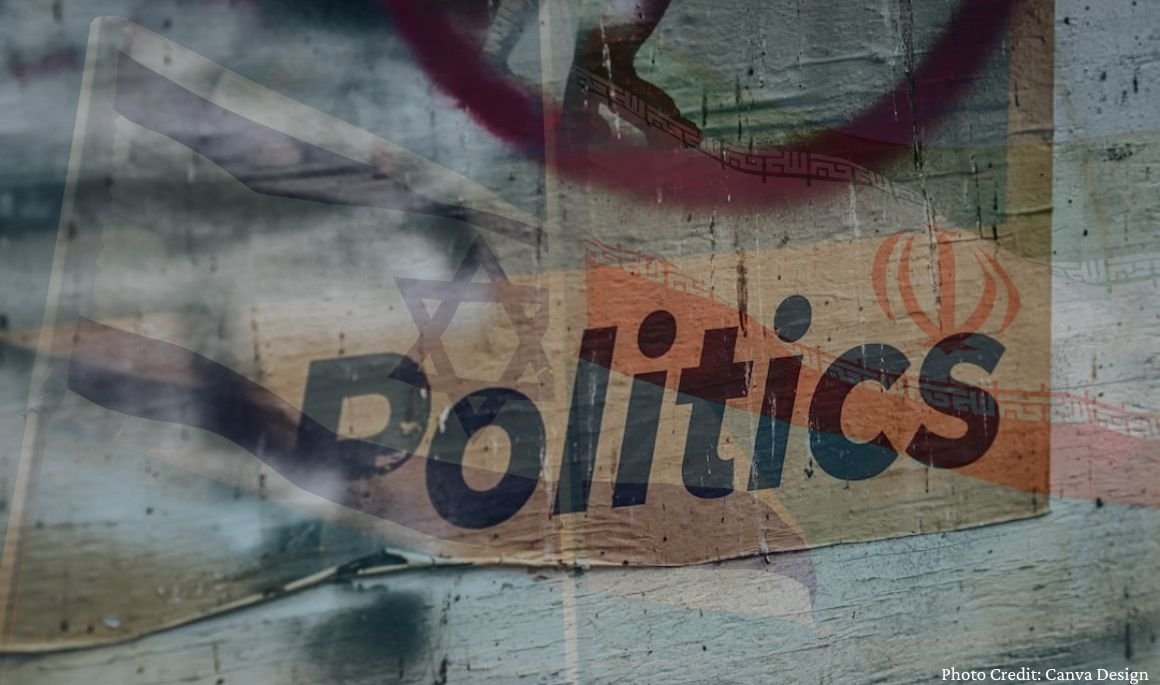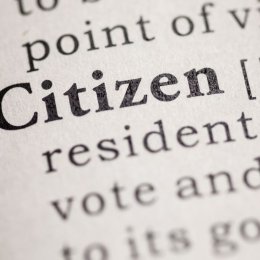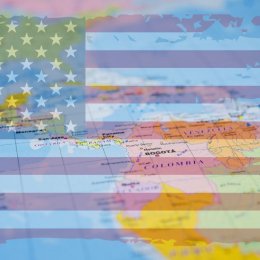- Norwich Blogs
- Blogs
- The Politics of Denial: Taqiyya, Ketman and Iran’s Israel Policy
The Politics of Denial: Taqiyya, Ketman and Iran’s Israel Policy
By Dr. Saeid Golkar
Iran’s foreign policy toward Israel combines harsh anti-Zionist rhetoric with strategic ambiguity. While officials like Deputy Foreign Minister Araghchi claim Iran doesn’t seek Israel’s destruction, the regime continues to fund and arm militant groups like Hamas and Hezbollah. This contradiction reflects the use of Taqiyya and Ketman — strategic deception rooted in Shi’a theology — to mask true intentions. Despite diplomatic reassurances, Iran’s actions reveal an ongoing commitment to challenging Israel’s existence.

Disclaimer: These opinion pieces represent the authors’ personal views, and do not necessarily reflect the official policies or positions of Norwich University or PAWC.
Iran’s foreign policy toward Israel is a complex interplay of ideological fervor, tactical flexibility, and deliberate ambiguity. A recent Fox News interview with Iranian Deputy Foreign Minister Abbas Araghchi sparked debate when he claimed, “It has never been Iran’s policy to wipe out Israel from the map.”[i] This statement appears to contradict the fiery rhetoric of Supreme Leader Ali Khamenei and Iran’s sustained support for armed proxies like Hamas and Hezbollah, both of which openly advocate for Israel’s destruction. So, does Iran seek to eliminate Israel? The answer is nuanced, rooted in a political theology of the Islamic Republic, which is a deliberate blend of rhetoric, policy, and strategic maneuvering.
Rhetoric vs. Reality
For decades, Iran’s leaders, particularly its Supreme Leaders, Rohullah Khomeini and later Ali Khamenei, have employed provocative language against Israel. Khomeini and Khamenei, have repeatedly called Israel an illegitimate and “cancerous tumor” that “must be eradicated,” a sentiment echoed during Iran’s annual Quds Day, which expresses solidarity with Palestinians and condemns Israel.[ii]
Anti-Zionism as a cornerstone of Iran’s foreign policy dates back to 1979, when the Islamic Republic was established. Ayatollah Ruhollah Khomeini, the revolution’s leader, declared Israel an “illegitimate state” that “should be wiped out.” Ayatollah Khamenei, who became Iran’s second supreme leader, has continued this rhetoric, frequently calling Israel a cancerous tumor, even predicting in 2015 that “Israel won’t exist in 25 years.” He often declared that we will promptly help any group that fights Israel and strongly supported October 7 as a liberation act.
Following the regime’s supreme leaders, Iranian Presidents, including Mahmoud Ahmadinejad, amplified this narrative, referring to Israel as the “Zionist regime” and advocating for its elimination during events like the “World Without Zionism” protest. Iran’s military leadership has been equally explicit. In 2013, Major General Hassan Firouzabadi, then-Chief of Staff of the Iranian Armed Forces, stated, “The Iranian nation is standing for the full annihilation of Israel.4 The Chief of Staff of Iran’s Armed Forces, Abdolrahim Mousavi, claimed that the destruction of Israel is his greatest wish.[iii] Similarly, in 2019, IRGC Major General Hossein Salami, killed by Israel in June 2025, declared that Israel “must be wiped off the map.”[iv] And all Israelis would be thrown into the sea, so they had better to learn swim. The IRGC has inscribed messages like “Israel should be annihilated” on its missiles, as part of its anti-Zionist propaganda.
In addition to this rhetoric, the geopolitical republic has invested billions of dollars in achieving its goal, from creating Shia militia such as Hezbollah to supporting Sunni militant groups such as Hamas and Palestinian Islamic Jihad.[v] Since 2011, the Islamic Republic has spent over 50 billion dollars to maintain the Assad regime's grip on power, contributing to the deaths of more than 500,000 people. These efforts are part of its broader strategy of forming an axis of resistance against Israel, establishing a foothold near Israel’s borders, and supporting Islamist militant groups committed to Israel’s destruction.
However, when addressing Western media or diplomats, Iranian officials, such as Abbas Araghchi and his former predecessor, Javad Zarif, adopt a more measured tone. They assert that their regime does not seek direct military confrontation with Israel or declare war. Instead, they frame their support for groups like Hamas and Hezbollah as humanitarian help or backing “legitimate resistance” movements in Palestine and Lebanon.
Strategic Ambiguity, Taqiyya or Ketman
How should we understand Araghchi’s remark? Some may argue that Iran’s humiliating defeat by Israel in the recent 12-day war, which resulted in the killing of high-ranking Iranian commanders and the destruction of its nuclear and missile facilities, might have caused a shift in Iran’s foreign policy. However, there is no clear sign of such a change. Those familiar with the Islamic Republic know that the foreign minister holds only a symbolic role and has limited power in shaping foreign policy. The main decisions are made by higher bodies, such as the Supreme National Security Council and, ultimately, Ayatollah Khamenei. Unless Khamenei himself publicly announces a new position, Araghchi’s statement should not be considered an official shift in Iran’s Israel policy.
Others will see Abbas Araghchi’s words as part of the regime’s strategic ambiguity. In the last five decades, the Islamic regime has sought to delegitimize Israel and support armed groups that challenge Israeli security. Still, it has simultaneously understood the cost of direct confrontation with a nuclear-armed state backed by the United States. They will argue that it reveals how Iranian diplomacy seeks to project moderation abroad while maintaining hardline credentials at home. For them, Araghchi’s comment, “They [Hamas and Hezbollah] are fighting for their own homeland so that they may say anything”, is a telling example of Tehran’s desire to distance itself from direct responsibility for its proxies’ most extreme rhetoric, while still enabling them materially and politically.
Although strategic ambiguity appears to be a more appealing concept among international relations scholars, the most straightforward interpretation is always the most accurate one.
Araghchi’s claim can be understood in the context of Shi’a political theology and Iranian culture. Here is Araghchi’s claim, which should be understood within the context of Shi’a political theology. One important concept is Taqiyya, a longstanding practice that means strategic lying or concealment. In Shi’a Islam, Taqiyya allows a person to hide or deny their beliefs when facing threats, persecution, or death. It is based on the idea of self-preservation during extreme situations, especially when openly expressing one’s faith could bring serious harm. Although initially meant to protect believers under existential threats, Taqiyya has also been used by some Muslims for personal reasons in everyday life.
In Iranian culture, similar concepts exist, but they are less formally defined, such as ketman, which refers to concealment. Ketman is a concept that describes the practice of dissimulation and duplicity as a form of defense, particularly in the face of oppressive regimes. As Czesław Miłosz wrote, it involves outwardly conforming to a dominant ideology while privately maintaining dissenting beliefs. Ketman allows individuals, groups, or countries to navigate challenging situations, protect themselves, and even preserve aspects of their true selves or values.[vi] In dominating the international order, where the United States is a superpower and Israel dominates the Middle East regime, Ketman has been used as part of the survival strategy of the Islamic Republic.
While it began as a survival tool during times of crises, Taqiyya and Ketman have, in the Islamic Republic of Iran, become a tool of statecraft, allowing Iranian officials to present one version of reality to Western audiences while pursuing very different policies on the ground.
Araghchi’s calm reassurance to a Western network that Iran does not seek Israel’s destruction fits neatly into this logic. It is not a repudiation of Iran’s longstanding anti-Zionist stance; rather, it is a calibrated statement meant to obscure, not to clarify. This is not a policy reversal; it is diplomatic dissimulation, designed to deflect pressure while Tehran continues to arm and fund groups whose charter includes the annihilation of Israel. Araghchi’s assurances are tactical, designed to lull international opinion while Iran strengthens its network of anti-Israel proxies.
Actions Over Words
Although Araghchi’s denial of Iran’s intent to “wipe Israel off the map” may sound comforting, it does not match the reality on the ground. The Islamic Republic continues to support militant groups and invests heavily, both militarily and financially, in efforts that threaten Israel’s security. Western policymakers should not rely only on diplomatic language. They must pay attention to Iran’s actions. Understanding Taqiyya and Ketman as a strategic method helps us better interpret the regime’s behavior. In Tehran’s political game, words often serve as a mask, but real intentions are shown through actions.
Dr. Saeid Golkar is the UC Foundation associate professor of political science at the University of Tennessee-Chattanooga, a senior advisor at United Against Nuclear Iran, and a writing fellow at the Middle East Forum.
[i] Iranian foreign minister addresses future of nation’s enrichment program [Video]. Fox News. (2025, July 21).
[ii] Vahdat, A., & Gambrell, J. (2020, May 22). Iran leader says Israel a ‘cancerous tumor’ to be destroyed. AP News.
[iii] X Post by Hafezeh Tarikhi, 23 July 2025
[vi] Mikanowski, J. (2017, October 9). ‘Ketman’ and doublethink: What it costs to comply with tyranny. Aeon.


